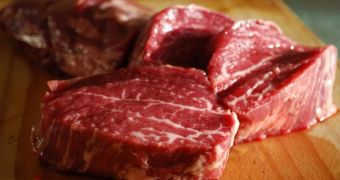A recent investigation carried out by researchers working with the Indiana University School of Public Health in Bloomington has revealed that getting too much iron from meat – red one in particular – might up an individual's risk to be diagnosed with a heart disease at some point in their live.
Simply put, there is evidence to suggest that the iron found in red meat has a negative impact on one's overall health condition, in the sense that is ups heart disease risk. Live Science informs that the iron found in animal-based products, and especially beef, is known to the scientific community as heme iron. When compared to the iron that vegetable sources pack, this one is better and faster absorbed by the body.
Hence, it sometimes happens that a tad too much of it works its way into the organism, simply because the body's natural iron-regulation system cannot control it as well as it does non-heme iron originating from vegetables.
According to the Indiana University School of Public Health researchers, having too much iron moving about the body can translate into inflammation and other damage to a person's arteries. In time, this can lead to the development of various heart diseases.
In a paper set to be published in the Journal of Nutrition, specialists explain that, in order to determine how heme iron consumption influences health, they compiled and analyzed information concerning the outcome of 21 previous studies.
These studies were carried out over a period of time of ten years, and they all focused on blood iron levels and risk of heart disease. All in all, the scientists looked at the overall health condition and the blood iron concentrations of as many as 300,000 participants.
It was thus determined that, when compared to individuals who did not consume all that much heme iron, those who were big fans of various types of meat and fish had a 57% higher risk of being diagnosed with a heart disease.
Interestingly enough, no link between dietary habits and increased heart disease risk was documented in the case of people who got their iron not from meat or fish, but from vegetable sources, the Indiana University School of Public health scientists say.
The researchers stress that, since a high consumption of heme iron from meat quite often goes hand in hand with a low intake of fruit and vegetables and an increased intake of saturated fat, they are currently unable to establish a cause-and-effect link between this compound and an elevated risk of heart disease.

 14 DAY TRIAL //
14 DAY TRIAL //